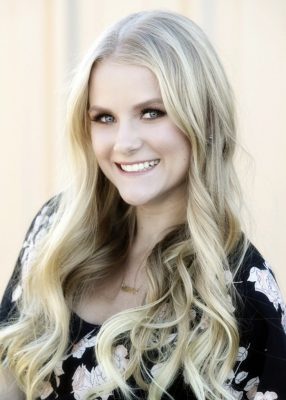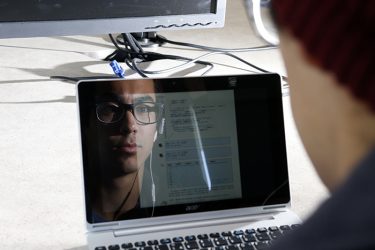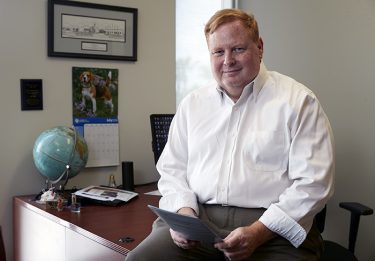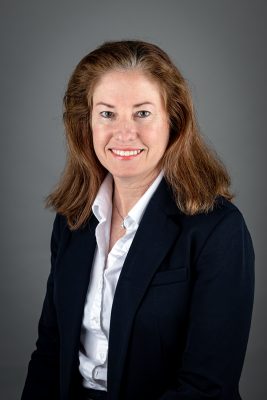
By Lana Sweeten-Shults
GCU News Bureau

At any other time, Grand Canyon University Business Marketing and Advertising major Alison Kovach would have tackled a flight of stairs, turned down a hallway or two, then sat outside her professor’s office, waiting to talk to her about an assignment she didn’t quite understand.
But this is unlike any other time.
When Kovach struggled with an assignment just a few weeks ago as she sheltered in place at her Scottsdale home because of COVID-19, she still was able to get help from her professor (and an A in the course). Although she didn’t see that professor in person, she connected with her through her virtual office hours.
“My connection with my professors was still there. They never lost touch (with me). I knew we were still in school. It was just online, so there was nothing different,” said the freshman-turned-sophomore.
That strong connection between students and faculty didn’t wane despite the coronavirus.
It could be why students thought so highly of their professors, giving them high marks in recent end-of-course surveys. In fact, more students gave their professors high marks this year than at the same time last year – 86.1% this year compared to 85.5% last year.

Not only that, but ground students’ completion success rate – the percentage of students who passed their classes – increased from 88.9% last year to 89.8% this year. What makes that latter number so impressive is that GCU decided to keep its grading system in place rather than go to a pass/fail system, which means students didn’t lose their stellar grades when applying for graduate school.
Albany, Ore., resident Erica Rietmann, who will be a hospitality management sophomore at GCU in the fall, mentioned how one of her professors gave her class an extension on one of their papers -- just one of the many accommodations her instructors made during distance learning. They gave more detailed explanations, too, and put "even more effort into building a relationship with us students," she said.
But, “I have to say the best thing about moving online was that GCU was already 90% there. The only change was meeting with professors over Zoom.”
Creating a distance-learning plan
That move from on-ground to online didn’t just happen organically.
Campus leadership asked for faculty members to volunteer to work on the transition over spring break. They had a big job – to plan what distance learning at GCU would look like during an unprecedented pandemic.
“More than half the faculty volunteered,” Provost Dr. Hank Radda said. “A lot of the faculty worked through spring break to make any modifications they needed to go from a fully face-to-face class to an online class.”
Once those plans were in place, “we did A LOT of communication with students and the faculty about what the expectation would be, how the faculty was going to create the Zoom calls, synchronous experiences and virtual office hours to make sure we had the same kind of support virtually,” Radda said.

Said Adam Eklund, Director for College Assessment and Program Operations for the College of Humanities and Social Sciences (CHSS), “When students came back from their breaks, they had announcements. They had information in their classroom about what to expect the remaining four weeks of class. Of course, they still had questions, but it definitely helped set the pace for the rest of the semester.”
One of the boons for the University was that it already had a learning management system in place, LoudCloud, that was modified for online learning. And since GCU’s spring semester ends earlier than most universities – sometime in April rather than in May – online learning was shorter than at other colleges. Ten of the 14 weeks of instruction already were completed at GCU by the time students had to leave campus unexpectedly.
Consistency and flexibility
Once those students left campus, CHSS Dean Dr. Sherman Elliott said it was important for the faculty to maintain a sense of consistency during distance learning so that students still felt as invested in their schooling as they did before the coronavirus disrupted everything.

“Consistency is crucial,” he said. “We had to provide them with that structure and balance.”
That meant maintaining the students’ schedule “so there was a sense of normalcy for them,” said Heidi Boldway, Director of Faculty and College Operations for CHSS.
If a student’s class normally started at 8 a.m. Tuesdays and Thursdays on campus, that student would meet with his or her professors and classmates online at 8 a.m. Tuesdays and Thursdays.
“They were still able to see their classmates, who they had already developed relationships with over the past 11 or 12 weeks,” Boldway said.
Not that the faculty didn’t emphasize flexibility, too.
“You don’t want to be flexible with the schedule – then your house is chaos,” Elliott said. “But you want to be flexible with due dates. You want to be flexible with the number of references you need or what have you. But all human beings need a structured environment, and that was what the faculty maintained.”
The University was flexible with technology problems, too, providing some students with devices that turned cellphone signals into hotspots or sending student workers home with laptops so they could complete their schoolwork.
“Whatever it took,” Radda said. “We really worked with our academic LEADs (learning advocates) out of the ACE Centers (Academic and Career Excellence Centers), the colleges and the faculty to support continuous learning.”
There was a big effort, too, to connect not just with students but fellow faculty. Some instructors, for example, were not as comfortable using technology as others.
“We had weekly faculty meetings over Zoom,” said Kathleen Downey, CHSS Director of Social Work. “Faculty shared lots of ideas. They shared technologies. They shared how-to’s. It really was helpful, especially for adjunct faculty, to remain engaged in the course but also add to their pedagogy.”
Strength in technology
What also made the campus-to-home educational experience successful is that GCU already is well versed in online education and the kind of technology that makes online learning possible, considering its 85,000-plus online students.
Boldway noted how instructors in some of the campus’ math classes, for example, used writing tablets that plug into their computers so they could work out problems in real time. Students could see that thinking process live, “which is very important with math,” she said.
Other faculty members used Zoom teams to split their classes into groups so there could be discussions in the classroom that happened synchronously, just as professors do with their classes on campus.

“It was a way to get them involved in the class and not just sit and listen,” Boldway said. “I think that’s where GCU excels (in technology and online learning).”
Downey added how professors did whatever they could to connect the pandemic to the content to make the lesson more relevant and applicable to students’ lives.
Outside of the classroom, University leaders met regularly to get feedback from faculty and monitor the online learning plan GCU put into place. Focus groups reported back how engaged students were and how well they were doing.
Faculty also participated in early alerts so that if a student wasn’t performing well, faculty would alert student success counselors and academic LEADS, who then contacted those students to see what the University could do to help.
Then there was the simple act of caring that Elliott also believes led to those high marks that students gave their professors.
He said he has asked his faculty to live by two things: cura personalis, a Latin term that means “care of the whole person,” and by the words of Socrates, who said to teach learners where they are at.
“If we’re in the middle of a pandemic and students’ parents are worried about losing their jobs, we had to first and foremost reach out and care for them, and then realize we have to teach them where they’re at, whether they had anxiety or they had stress or were scared,” Elliott said. “That’s where the faculty did amazing things to keep them alive and keep them moving.”
Those amazing end-of-year numbers that showed increases in students’ completion success rate and in their satisfaction with their instructors “was sort of the final measure of that (all the coronavirus distance-learning efforts),” Radda said. “It’s sort of the piece at the end of the story, about everything we did all those weeks ago when we began the transition to online.”
They were numbers that surprised Radda, who thought the University might see a slight drop in grades or teacher satisfaction. He was happy he was wrong.
“They (the faculty) really went above and beyond in helping us through the last few weeks,” Rietmann said. “They made it an experience that was enjoyable rather than miserable.”
GCU senior writer Lana Sweeten-Shults can be reached at [email protected] or at 602-639-6901.
***
Related content:
GCU Today: Anatomy duo muscles into distance learning
GCU Today: GCU expert forecasts post-virus shift to more dynamic future of learning
GCU Today: No hospital, no problem: Nursing students go virtual



































































